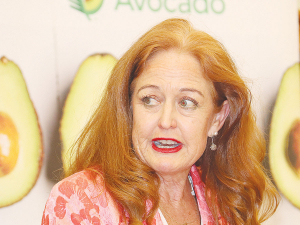Export delays, weather and global supply pressure hit NZ avocado growers
The avocado industry is facing an extremely challenging season with all parts of the supply chain, especially growers, being warned to prepare for any eventuality.
 NZ Avocados Jen Scoular says despite the current challenges facing the industry it is looking forward to the World Avocado Congress, which is being held in NZ next year.
NZ Avocados Jen Scoular says despite the current challenges facing the industry it is looking forward to the World Avocado Congress, which is being held in NZ next year.
Parliament recently played host to the avocado industry which has had - and still is having - quite a bumpy ride, with poor prices and other challenges. However, despite dealing with these problems, the industry is looking forward to the World Avocado Congress, which is being held in NZ next year. Peter Burke was at the event.
The stylish Grand Hall in Parliament buildings was the venue for the event and tasty avocado nibbles and dips were popular with the nearly 100 guests.
Speaking to the gathering, chief executive of NZ Avocados Jen Scoular conceded that the past season had been tough and that this year things are not looking much better with lower returns compounded by higher input costs - including labour - on the horizon.
She says part of the answer to recovery lies in the industry upping its overall productivity and taking a very close look at production costs. Scoular reckons there is plenty of information available to help growers to change.
"We've got a grower who achieved 59 tonnes of avocados per hectare against the national average of 11 tonnes per hectares," she told Hort News. "The people who are doing this are not doing anything special. They haven't got different root stocks - they are just doing best practice very well and innovating in their own way."
Scoular says avocados is a popular industry to buy into and often it's dairy or sheep farmers who have retired but still want to be involved in agriculture and think growing avocados might be an easier lifestyle.
"It is not their main income and they are not necessarily growing for the money but they like growing a sustainable, delicious product,” she adds. But in terms of making money, Scoular says people have to focus on productivity, which means gathering key data such as soil moisture and having a good grip on costs such as labour. She points out that low-yielding trees are a problem.
“If your trees are producing 400-500 avocados per tree verses say 150 a tree, it is costing nearly three times as much to pick a poorly managed orchard and that’s something growers need to think about.”
Scoular still believes that avocados are an amazing product that consumers love and the industry just has to do things better.
Upcoming World Congress
A key date for the sector is April next year, when the World Avocado Congress will be held in NZ for the first time.
Already 500 people have registered to attend the event – with half of these from overseas. Countries such as South Africa Israel, Colombia, Chile, Mexico, Uganda, Kenya, Spain and Australia will be represented at the congress.
Jen Scoular says NZ Avocados has been working on the conference programme for about 18 months and already has a good line-up of speakers, including some from overseas. As well as the congress, which will be held in Auckland from 2 – 5, a number of field days and tours are also planned for those who want to see some NZ orchards.
However, Scoular says the congress programme is still not finalised and they are still looking for more sponsors and potential speakers.
Voting has started for the renewal of DairyNZ's milksolids levy.
The most successful catchment groups in NZ are those that have 'a source to sea' approach.
Associate Agriculture Minister and Manawatu dairy farmer Andrew Hoggard says the free trade agreement (FTA) negotiated with India is not a bad deal and his party, Act, will support it when it goes before Parliament.
Newly released data from Environment Canterbury (ECan) Farm Environment Plan (FEP) audits are showing a dramatic lift in environmental performance across the region.
A solid recovery of global dairy prices this year makes a $9.50/kgMS milk price almost a shoo-in for this season.
As New Zealand marks the United Nations’ International Year of the Woman Farmer 2026 (IYWF 2026), industry leaders are challenging the misconception that women only support farming.

OPINION: Here w go: the election date is set for November 7 and the politicians are out of the gate…
OPINION: ECan data was released a few days ago showing Canterbury farmers have made “giant strides on environmental performance”.